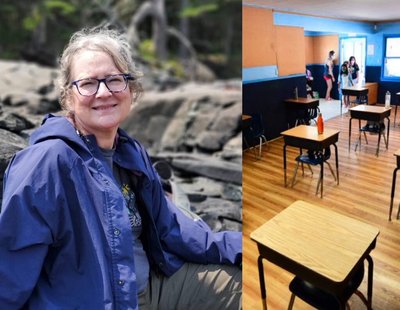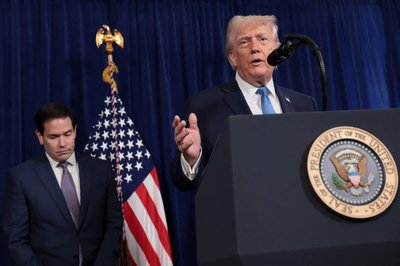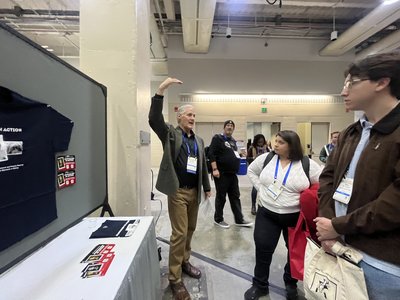Editor's note: Last spring, Laura Dinerman retired from her career as a science teacher and curriculum developer in Maryland after 33 years. She now works as a curriculum writer for an environmental education organization. Dinerman joins a growing number of teachers to retire early or leave teaching during the pandemic in a profession already challenged by high turnover rates.
by Laura Dinerman, teacher (ret.)
Over the past 10 years or so, changes in teacher autonomy and use of time have made the teaching profession very challenging. Ultimately, frustration over last-minute requests to proctor tests (instead of teaching), complete paperwork (instead of interacting with students), jump through training hoops to avoid litigation (instead of exploring science content and opportunities) and conflict over standardization of content and methods drove me to the brink. Growing bureaucracy drove me over it.
Over the past 10 years or so, changes in teacher autonomy and use of time have made the profession very challenging.
My district, for example, has systems in place to support students with learning differences, and that is a good thing. Any parent can access these supports and each student who receives them gets something extra from teachers — individual assessments of progress, accumulated work samples to prove implementation of an individual learning plan, written evaluations of progress and meetings with parents, administrators and counselors on student progress.
However, more needed to be done to meet this positive development. As more and more students are granted these supports, the workload for teachers increases without extra time or support to meet these new legal requirements. Consequently, these requirements must be met after work hours, if the teacher is willing and able to do, or instead of planning, teaching or grading. Sometimes a teacher has 32 students in a class and over 75% of them require extra support. That same teacher may have five classes each day in multiple subjects. The workload for meeting legal requirements for extra support is astonishing.
RELATED: 'More difficult and more exhausting’ — Teaching in year three of COVID
Even as individual extra support has increased, so has standardized testing. During the "testing seasons," teachers may spend weeks at a time proctoring tests as their students are pulled into massive testing sessions. These testing sessions happen multiple times a year and learning essentially stops while assessments are given. Every student in the school gets a new schedule for a few days or a few weeks depending on the type of testing that is being done. Students may only attend school for half of the day and attend testing sessions during the rest of the day.
Proctoring an exam involves multiple teachers per group passing out tests or Chromebooks, reading directions to students and watching the students during the test. Teachers are not permitted to do anything other than watch students take tests for hours at a time. It is a mind-numbing and frustrating waste of time and talent.
Teachers are not permitted to do anything other than watch students take tests for hours at a time. It is a mind-numbing and frustrating waste of time and talent.
These and other accumulated indignities drove me to consider leaving teaching, but I didn't act on it until COVID policies demonstrated how little I was valued as a science teacher, curriculum developer and community member. Chemical disinfectants that teachers were told would be used to clean the building upon return to school last spring triggered severe respiratory reactions in me. Ultimately, my request for dispensation to be absent during cleaning was rejected, even though the CDC states this is exactly what should have happened.
Retiring from teaching was a tough decision. I loved my years in the classroom, and I knew I was not yet ready to leave education. My students and their families always made me feel valued. That is why I worked so hard for so long to continue as a classroom teacher.
For 33 years, I taught science and technology on-level as well as advanced and honors-level classes. I sponsored clubs, coached sports, took students all over the world, wrote college recommendations, wrote curricula, chaperoned school events, counseled students, mentored students and other teachers and many other tasks that are part of a teacher's job that don't make it into the job description. I didn't realize how hard the job of a classroom teacher was until I left and the weight of the job lifted.
I didn't realize how hard the job of a classroom teacher was until I left and the weight of the job lifted.
Happily, I have a wonderful, new job that I love. I spend my time creating lessons and sharing them with people who let me know how much they appreciate my efforts and how much they appreciate me. I get to reach teenagers and adults, both virtually and in the field, through experiential lessons, with team members who share a vision for making the world a better place. I get to network with other teachers at national and international levels to share ideas and a passion for science. For the first time in my life I have my own office, my own computer, and a level of cleanliness that I've never had in my work environment before. It feels like I graduated and got a "real job."
And, that's too bad because classroom teaching is a real job. It is a job full of highly educated people who also have a passion for their subject area and a desire to make the world better.
Laura Dinerman is a Maryland native who has spent over 30 years in education as a science teacher, curriculum developer and Howard Hughes Medical Institute BioInteractive Ambassador. She recently left the classroom to work with Ecology Project International (EPI) in order to focus on the importance of environmental literacy and experiential learning in science, and to help make environmental education more accessible to all students. EPI's mission to inspire youth with nature and empower them with science resonates with Dinerman’s work and future goals as she continues to work towards preserving and protecting the environment through education.




